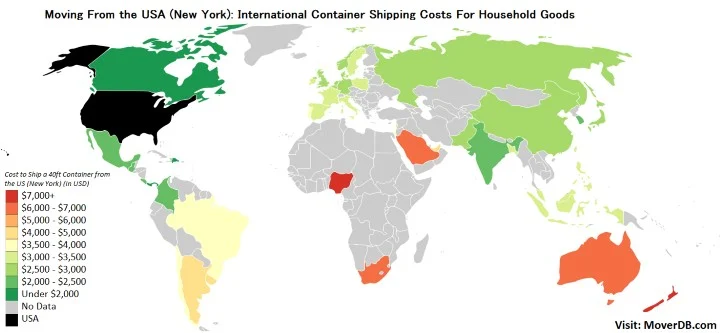
International Shipping Terms You Should Know
So you’ve decided to move abroad and start a new phase in your life. Moving abroad is a huge life change, and can be exciting and overwhelming at the same time. One of the things you’ll probably need to know about is international shipping. Reading about international shipping terms and shipping costs can make your head spin because of how dense and lengthy it is, and it can become more difficult because costs may vary country to country and even state to state. Read on for the most informative guide to International Shipping Terms.
Here’s a guide to help familiarize you with international shipping terms so when the time arrives for you to move you won’t panic. Whether it’s about the belongings you won’t be able to carry with you or other moving worries. Now you can be well-informed about exactly how much (or at least have a close estimate of how much) the shipping of your beloved items will cost you and in how long they will be delivered to you.
But first, don’t forget to prioritize and sort out the possessions that are absolute necessities. Such as, those that are needed for your comfort, and those that are luxury items and can wait to be shipped later on.
Also, for the things that will be shipped to your new home, later on, you will need to find a place for storage sorted before your move. It could be a friend or family member’s house or a professional company.
Now for some international shipping terms that you should get acquainted with:
International Shipping Terms related to Shipping Your Cargo Overseas
While skimming through options to ships goods abroad, two terms will come up over and over: FCL AND LCL which stand for Full container load and Less container load respectively.
These are important for vehicle shipping from your shipping location to the place of destination. This allows you to save big bucks. If your shipment is going from country A to country B but the amount of things are not enough to fill the whole container, you can book half a container. The other half will be allotted to the same shipment going to the same destination. This saves space of the cargo and also your money.
EXW
EXW stands for Ex works. This means that during the process of shipping, the item is either collected from the place specified by the seller or brought to the port themselves. Therefore, the buyer or receiver is responsible for any costs and the arrangements made from the location of loading to the ultimate destination. The buyer or receiver is responsible for each and every step and has to specify if and any additions he wants.
FCA
FCA or Free Carrier shipping method allows the arrangement of customs and trucking in the new country to be done by the seller. This allows the seller to be responsible for all and every responsibility within their country till the destination. Therefore, the buyer or receiver will only be responsible after the shipment has arrived. The export documentation are the seller’s responsibility.
CPT
CPT or carriage paid to is a little tricky and is only recommended for those with a litter of credit. In the CPT exchange, the seller is not only responsible for all documentation in their country but from the time of booking till it reaches the terminal. Additionally, the seller has to be responsible for arranging freight to the receiver’s destination. But not for the insurance of the goods. This condition makes it risky, which is why you should consider a CIP agreement.
DAT
DAT or Delivery at Terminal shipping requires the seller to be responsible for the costs and charges including delivery in the export country. The receiver is responsible for the costs and charges or the import country. This makes both parties to be in power. Charges after the unloading, however, are meant to be taken care of by the receiver.
AP
The person sending the shipment conveys when the products are set at the conveyance of the receiver. Additionally, on the arriving methods for transport prepared for emptying at the named place delivery. The costs reaching up till the terminal are paid by the seller whereas the costs after unloading are dealt with by the receiver.
DDP
DDP or delivered duty paid shipment. This means the entire cost of the shipment is paid by the seller that include documentation and costs of the import customs. The person who sends the shipment is responsible for the entire procedure. The receiver is only responsible for unloading the shipment and clearing out any extra clearance payments. This puts the sender of the shipment in a tight spot. He is responsible for getting the shipment through customs and getting all authorizations in the receiver’s country. There are many risks and unforeseen extra costs involved with this method of shipment.
FAS
Free Alongside Ship is the method that is least recommended. In this method of shipment, the seller or sender of shipment is responsible for the export country clearance stages and the receiver arranges the rest. The receiver has to pay all costs and also be responsible in case of any breakage or damage to the goods. It only asks the seller to arrange the clearance at export terminal
FOB
FOB or Free On Board allows the sender of the shipment to be responsible of all costs and the risks till the goods are loaded with the shipment. The sender is also responsible for getting the export item clearance in order. The receiver only pays the cost of marine freight and bills of transportation.
CFR
Cost and Freight allow the sender of the goods to pay for costs till the shipment reaches the port of destination. Additionally, the receiver is responsible for the safety of the goods and costs while the shipment is being transported. The sender is not responsible for the safe delivery of the packaged goods to the place specified.
Air Freight
The main disadvantage to air freight is the cost. But it is very effective if you are in urgent need of some things and want the shipment delivered within a short period of time.
Needless to say, you will need to find a trustworthy person. One whom you can hand over the responsibility of sending your possessions through a shipping company. Apart from being trustworthy, the person will also have to be very patient as shipping goods from one country to another is not a piece of cake. He/she must also have constructed knowledge about the International Shipping Terms.
The above-explained guide, however, may help you get through the process with some ease, if not a lot.
Enjoy these International Shipping Deals
Have Experience in the Moving Industry? Want an Additional Income Stream? Work With All Around Moving!
Put your experience and drive to good use. Profit as a moving consultant. Click here to learn more.






